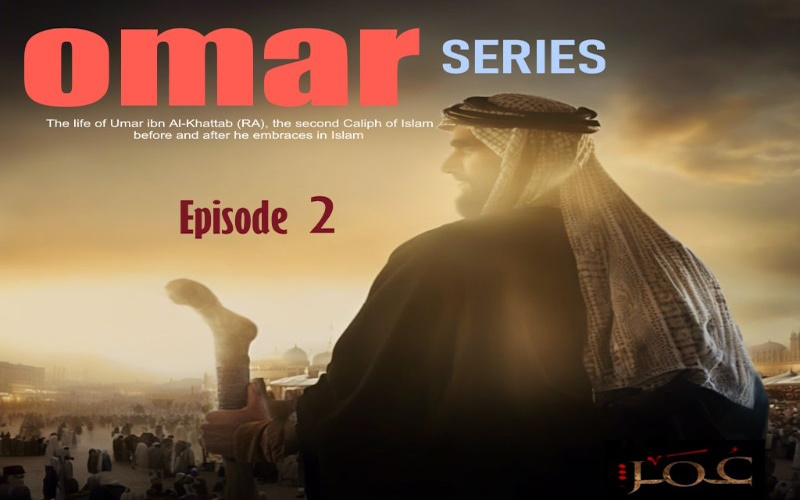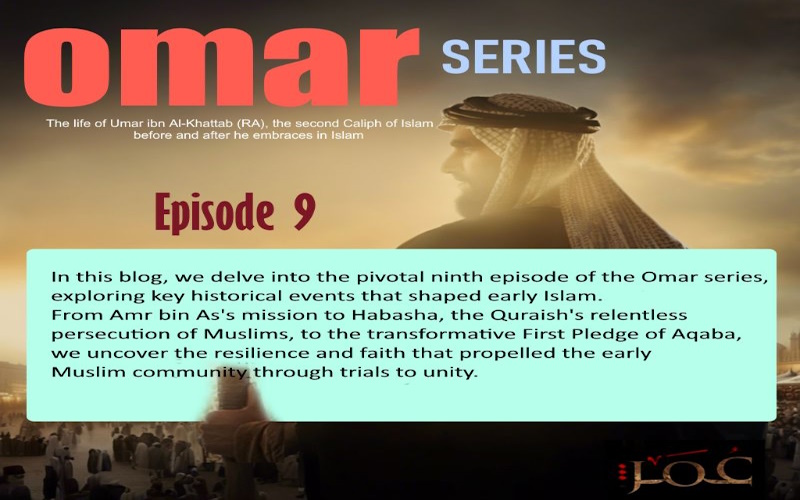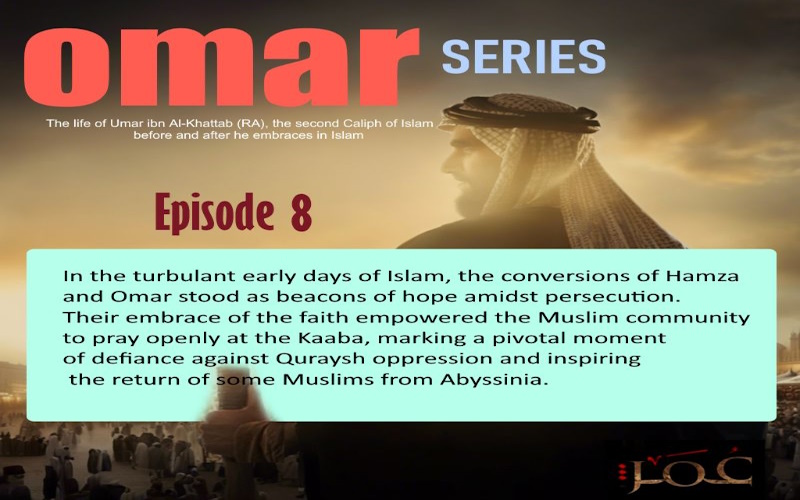Omar Series Episode 2
In the second episode of the Omar series, unfold many compelling events and personalities that are rooted in the early history of Islam. This episode focuses on the social and political situations in Mecca. It introduces some new characters, each carrying the weight of their tribe’s reputation and place in Quraysh society.
At the start of the episode, Abu Bakr, who would later become known as one of Prophet Muhammad’s closest friends and the first Caliph of Islam, turns down an offer to join the elite group at Dar ul Nadwa. He would take the lead in such attendances in the past, but now he is holding back. Abu Bakr is from the Taym tribe, part of the Quraysh confederacy. Abu Jahl, a well-known leader from the Makhzum tribe known for his strong resistance to Islam, is suspicious of his refusal.

Introduction of Usman and call to Islam
Abu Bakr meets Usman and, while talking, introduces him to the message of Islam and asks him to keep it secret. Usman ibn al Affan is from the Banu Umayyad tribe. He is another vital personality who, later in history, became the third Caliph. This type of one-to-one conversion of people is how Muslims spread their message in the beginning and kept the message of Islam to close relatives and friends.
Ali and Abu Talib: A Faithful Nephew and a Caring Uncle
Ali is the Prophet Muhammad’s cousin and a member of the Banu Hashim line. He is shown talking with his father, Abu Talib, about his relationship with the Prophet. The conversation shows what “Wahi” means (receiving a message from angel Gibraeel) and why Muhammad is called a prophet.
The Rise of Early Muslims: Ammar and his family
The introduction of Ammar, his father Yasir and his mother Sumayyah suggests that Islam was quickly spreading among people from the lower classes. Ammar, along with his parents Yasser and Sumayyah, would become known as one of the early followers of Islam and among those who went through torture at the hands of Abu Jahl.
The fact that Sumayyah went to Abu Jahl’s house as a housemaid shows how society worked in Mecca. Even though she was a freed slave, she was poorly treated and looked down upon among Quraish in Mecca, a practice that Islam came to remove from the hearts and souls of its followers.
The Quraysh Elite: Power Play and the Resistance to Change
This episode introduces several leaders of the Quraysh, such as Utbah ibn Rabi’ah from the Banu Abd Shams clan and Abu Sufyan ibn Harb from the Banu Umayya clan.
Utbah was a respected elder in Mecca and played a significant role in the city’s politics. On the other hand, Abu Sufyan emerged as a crucial figure opposing the message of Islam. He later became a prominent leader in the Quraysh community.
The discussions among these leaders, including Abu Jahl from the Makhzum clan and Abu Sufyan from Banu Umayya, revolve around the growing influence of Islam and how it threatened the established social order, which was based on tribal superiority and economic control.
The Public Declaration at Mount Safa: A Call to the Quraysh
The historically significant event of Prophet Muhammad’s call to the Quraysh occurred on Mount Safa. In this pivotal moment, he gathered the people. He asked whether they would believe him if he warned them of an army behind the hill, poised to attack. They affirmed their trust in him, acknowledging his reputation as ‘Al-Amin’ (the trustworthy) and ‘As-Sadiq’ (the truthful). With their acknowledgement of his trustworthiness, he then presented them with the message of Islam, urging them to abandon idolatry and worship the one true God.
This was a strategic move, utilizing his well-known honesty to present a message that would challenge the very foundations of Meccan society and religion. It was at this point that Abu Lahab, one of his uncles, openly rejected the message, marking a clear divide between the early Muslims and their detractors. The incident is significant as it was one of the first public calls to Islam and set the stage for the eventual widespread acceptance and spread of the faith.
The event on Mount Safa is a critical episode in the seerah (biographical accounts) of the Prophet Muhammad (PBUH). It is well-documented in various Islamic sources, including Ibn Ishaq’s “Sirat Rasul Allah.”
Utbah’s Caution versus Hind’s Hostility
The episode reflects the differing perspectives among the Quraysh leaders regarding the Prophet Muhammad’s message. Utbah ibn Rabi’ah, a senior member of the Banu Abd Shams, is known to have advised a more cautious, diplomatic approach in dealing with Muhammad. On the other hand, his daughter Hind bint Utbah was noted for her intense hostility towards Muhammad and the early Muslims. This contrast underscores the variety of responses to Islam within the Quraysh leadership. It foreshadows the deepening division that would grow within the tribe.
Hind bint Utbah’s animosity was particularly pronounced during the Battle of Uhud, where she is reported to have mutilated the body of Hamza ibn Abdul-Muttalib, the Prophet Muhammad’s uncle, out of vengeance.
Family of Yasir: Early converts
In Islamic tradition, Ammar ibn Yasir is a companion of the Prophet Muhammad (PBUH), who faced severe persecution from the Quraysh for his and his family’s conversion to Islam. His parents, Yasir ibn Amir and Sumayyah bint Khayyat are also revered figures in Islamic history as some of the earliest martyrs of the faith.
Ammar recites the opening verses of Surah Ad-Duha to his parents. There is no definitive historical record detailing the authenticity of these specific verses that Ammar ibn Yasir might have recited to his parents. The story, as depicted in the television series “Omar” or any other dramatization, should be taken as a creative representation and not necessarily as a factual recounting of historical events.
The Surah Ad-Duha (The Morning Hours, 93rd chapter of the Quran) is often mentioned in Islamic tradition as a source of comfort and reassurance, especially in times of distress, due to its message of hope and the mercy of Allah. However, I could not find any authentic record stating that Ammar recited verses from Surah Ad-Duha to his parents.
Many details in films and series about early Islamic history are dramatized for storytelling. They may only sometimes align with authenticated historical accounts. For accurate historical and religious information, one should refer to established sources of Islamic history and explanation, including the Quran, hadith collections, and the Prophet Muhammad (PBUH) biographies written by reputable scholars.
Wrestling Match: A Glimpse into Social Customs and Historical Characters
In an interesting subplot, the episode depicts the social customs and entertainment of 7th-century Arabia through the character of Wahshi, a slave renowned for his wrestling ability. Due to his Ethiopian heritage, his introduction occurs alongside that of Bilal ibn Rabah, known as Bilal al-Habashi. The narrative sets up a stark contrast between Wahshi’s physical strength and Bilal’s profound wisdom and moral fortitude.
Wahshi’s historical significance is rooted in his grim role during the Battle of Uhud, where his master compelled him to kill Hamza ibn Abdul-Muttalib, the beloved uncle of the Prophet Muhammad (PBUH). Wahshi’s later conversion to Islam and his life as a Muslim is well-documented in Islamic texts, illustrating the transformative power of the faith.
The character of Rihana, presented in the series with a storyline involving affection for Wahshi, does not have a basis in the authenticated annals of Islamic history. Her portrayal is a creative construct by the writers of the “Omar” series, which, while drawing from historical events and figures, also employs artistic license to enhance the dramatic effect and engage the audience. Although not historically substantiated, fictional elements contribute to the narrative depth and are a common feature in historical drama productions.
Authenticity and Sources in History
While the Omar series dramatizes some parts of the story for dramatic effect, it ensures that these critical events are accurate to the historical record. The show correctly shows each character’s tribal affiliation and impact on Mecca, giving viewers a complete picture of the complicated society from which Islam grew.
During the early years of Islam, Meccan society changed a lot. Episode 2 of the Omar series shows this critical time by combining historical details with a dramatic story.






